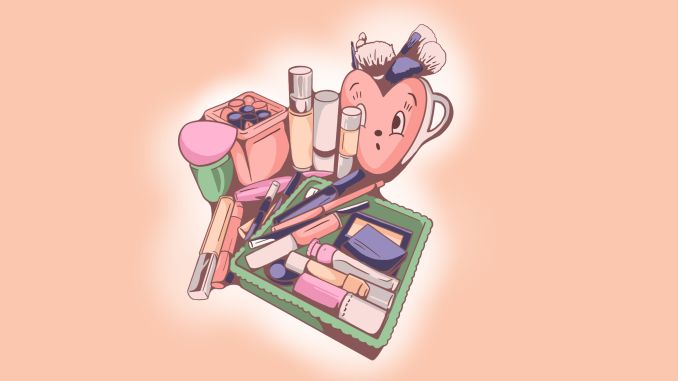
I remember sitting in my pink tights and ballet slippers in front of the floor-length mirrors at my dance studio while I watched a girl a couple of years older than me flawlessly blend foundation into her skin. At around 10 years old, I admired how beautiful she was and returned to giggling and exchanging lipsticks with my friends as we got ourselves ready to perform on stage.
I’ve been a dancer since I was 2 years old and started wearing makeup for my performances in third grade. My friends from the studio and I taught each other how to curl our lashes and layer mascara, seamlessly blend out eyeshadow and brighten the inner corners of our eyes with white shimmery powder. Makeup was at the core of our girlhood, and it has played a significant role in positively and negatively affecting my self-image.
When I was in fifth grade, I heard the girls in my class talk about getting their first periods. I thought of the girl from dance who knew how to perfect her skin with liquid foundation and a sponge and thought she must be old enough to have her period.
She exemplified young womanhood for me at the time. I knew I was becoming a woman soon, too, and I wanted to be pretty like her. However, I wasn’t allowed to wear makeup except for when I danced, so I came up with a plan.
“Mom, can we make a deal?” I asked as I nervously crept down the stairs, attempting to sound confident. “When I start my period, I get to start wearing makeup everywhere, not just for dance.”
Eventually, after a lot of pleading, my mom agreed to my idea, probably assuming I’d forget. However, I held her to it. The minute I bled through my pastel pink Easter Sunday dress in sixth grade, I asked my mom for some pressed powder to cover my red-faced embarrassment.
My makeup journey started out simple. I’d take a compact and a sponge and dab it around my skin, mimicking my mom’s daily application. Throughout the next couple of years, I hit every awkward makeup phase imaginable.
Although my experimentation with pale shimmery lips in seventh grade was bad, the absolute worst was my eyebrow evolution: for years, I continued to draw them on thicker and bolder and somehow redder. My friends literally called me an angry bird in my freshman year of high school.
Even though my makeup became a running joke among my friends, I made sure to put it on every day. I progressively added more steps like foundation, blush and contour, to my morning routine, following YouTube tutorials and learning from my friends. Putting on a face of makeup was just as essential to getting ready as brushing my teeth.
However, wearing makeup daily had a detrimental effect on my self-image: I became obsessed with how I presented myself. Forgetting a minor step in my makeup routine was enough to ruin the rest of my day.
I would picture a distorted version of my face, wishing I could’ve made myself prettier before leaving my house. I imagined the people around me thinking I was hideous for a reason as small as forgetting to curl my eyelashes.
By the time I was a junior in high school, I didn’t recognize myself without makeup. If I wasn’t wearing any, I’d glare at myself in every mirror I passed, hating my appearance and wanting to peel away my skin. I had become so accustomed to what I thought was the prettier version of myself I created that I didn’t know — and didn’t want to know — what I actually looked like.
This mindset took a toll on me and I wanted to fix my unhealthy relationship with makeup. I set a goal to attend school bare-faced by the end of my senior year. I failed, but it was partially due to the COVID-19 pandemic cutting the year short.
The quarantine period of the pandemic also gave me the chance to experiment with makeup styles. I discovered I could embrace different versions of myself by trying new eye looks or darker lipsticks. I experimented with what makes me feel confident. Slowly, makeup became more about having fun and taking chances to express myself rather than covering up. Makeup can be an accessory to my outfits or simply, as it was for me as a little girl, a way to bond with other girls.
As makeup became a way to express myself rather than a mask, I started appreciating my natural appearance more. I’ve been trying to feel comfortable without wearing makeup for years and, now, I’m finally starting to feel confident in my own skin.
I often feel bare without makeup, but I’ve begun to accept I am still authentically myself, even after washing my face at night. I can run to the grocery store without getting ready or hang out with my friends while only wearing some mascara.
I’ve spent my adolescence trying to navigate a tricky relationship with self-image, and makeup has been both an obstacle and an outlet for creativity. As an adult, I’m learning I am beautiful without makeup enhancing my face, but it’s also not a bad thing to love wearing it.


Be the first to comment